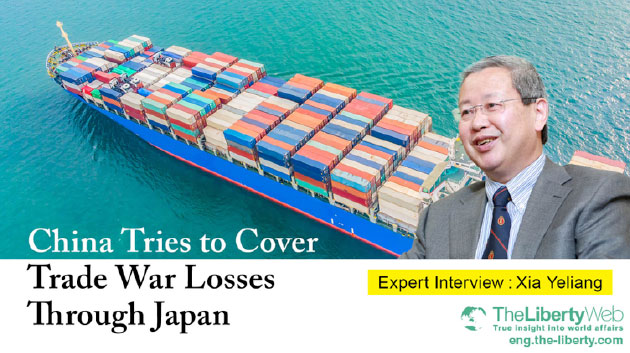China Tries to Cover Trade War Losses Through Japan:
An Interview With Xia Yeliang
Xia Yejiang
Co-author of the “Charter 08” Manifesto
A renowned economist, Xia obtained his doctorate at Aurora University, Shanghai. He was one of the early people who drafted and signed the “Charter 08” manifesto, for which Liu Xiaobo is best known. He was dismissed from Peking University for criticising communism, and defected to the U.S. He is currently a member of the American public policy think tank, Hoover Institution.
Interviewer: Hanako Cho
How is President Trump’s trade war affecting China? The Liberty Magazine interviewed Chinese economist Xia Yeliang, now living in the U.S.
–Where do you see the U.S.-China trade war leading?
Xia: I think the U.S. will win the trade war. It has made a tremendous impact on the Chinese economy, causing credit uncertainty and a steep drop in unemployment.
Until recently China used to make fixed asset investments in real estate, like condominiums and factories. This was pulling the economy. But they overdid real estate construction and, as a result, what used to take them 2 or 3 months to sell is now taking 3 years in some areas.
The situation is far more serious than Japan back in 1981 before the bubble burst. Everyone is afraid of the bubble bursting, so many people want to possess the far more reliable dollar. So people are selling the yuan for dollars, which is causing capital flight.
Now the exchange rate is around 6.9 yuan to the dollar, but I speculate that it will eventually drop to 7.5. China could officially be criticized for currency manipulation.
Now that their fixed asset investments have met a dead end and nor can they grow their economy by expanding their exports because of the trade war, China is facing a serious unemployment crisis. This year at the next National People’s Congress, China lowered their economic growth rate goals down to between 6 and 6.5%. It is estimated that 7 million Chinese people lose work for every 1% drop in GDP. China’s official reports state that the unemployment rate is around 4.5%, but experts estimate that the real unemployment rate is 10%, which would make that 30 million people.
Rising unemployment rates cause social unrest, so Premier Li Keqiang has ordered regional cities to come up with relief measures for unemployment.
Why Xi Jinping Is Approaching Japan
–Reports say that China’s foreign currency reserves are drying up. Do you think the Beijing government can continue their exchange intervention operations?
Xia: They say that China used to have $3.5 trillion in foreign currency reserves, and now it’s dropped to $3.2 trillion, of which $1.1 trillion consists of U.S. government bonds. U.S. bonds are a low-risk asset, and the Beijing government wants to hold onto it, so it’s not immediately usable.
China also has to import things like soy beans, Boeing aircrafts and semiconductors, so the foreign reserves they can actually use are limited. There are bank workers in China who say absurd things to tell their customers like, “Don’t withdraw dollars. Instead deposit dollars, and then you can withdraw yuan.” In other words, the banks are trying to restrict the withdrawal of foreign currency.
Once the U.S. activates additional tariffs, and China’s trade surplus is reduced, it will cause a greater decline in dollar reserves. If this happens, try as they might the Chinese authorities will no longer be able to support the yuan through buying it. What will happen next is the yuan’s collapse.
The only way out of this plight is to replenish their foreign reserves through Japan. Xi’s sudden 180 degree change of attitude towards Japan comes from his need to woo Japan, because without them, China can’t cover the losses they’ve incurred in the trade war. Japan has to realize what Xi’s true intentions are.
Anti-Government Protests May Happen in China
–Do you think anti-government protests will emerge if China’s economy continues to go downhill?
Xia: It is highly likely that protests will break out from social unrest. Already the acquisition of commodities such as grains and pork are no longer stable, which is affecting the people’s livelihoods. In fact, it is likely that the People’s Liberation Army and other Communist Party government-related people will join in the protests. There are many people in the Party and the army who don’t like the way Xi Jinping and the leaders are running the country. In this case, they will be facing the crisis of a collapse in government.
The people fear that even if they start a democratization movement the Communist Party will come and suppress it. But I think they will choose freedom over fear. There will also be great support from dissidents outside of China.
–What do you think China needs to democratize?
Xia: I think they need to acknowledge the value of freedom. Chiang Kai-shek’s son and former President of Taiwan, Chiang Ching-kuo was a man who knew that humans have a tendency to freely speak their opinions and freely assemble. That’s why in 1986, Taiwan formerly accepted freedom of assembly and freedom of the press. This was the start of democracy in Taiwan.
I want to continue aiming to make China a free country like Taiwan.



















